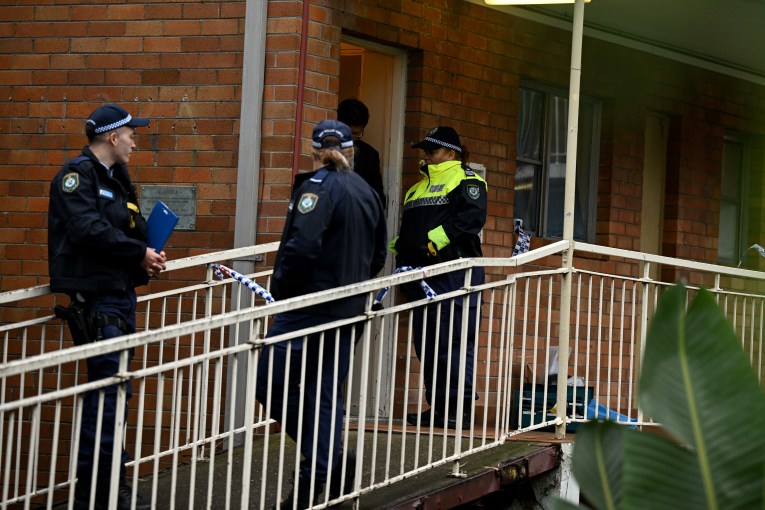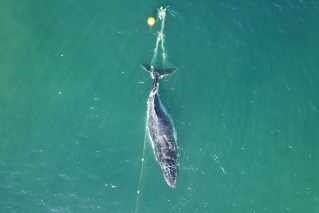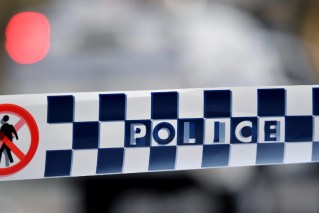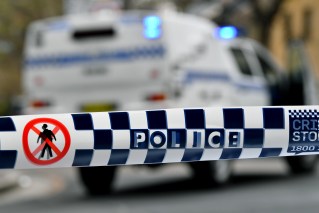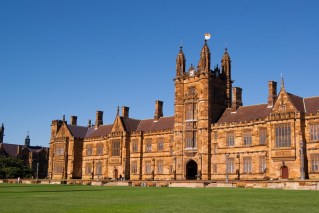Gin, guns and getaways: How a bushranger gang pulled off Australia’s largest gold heist
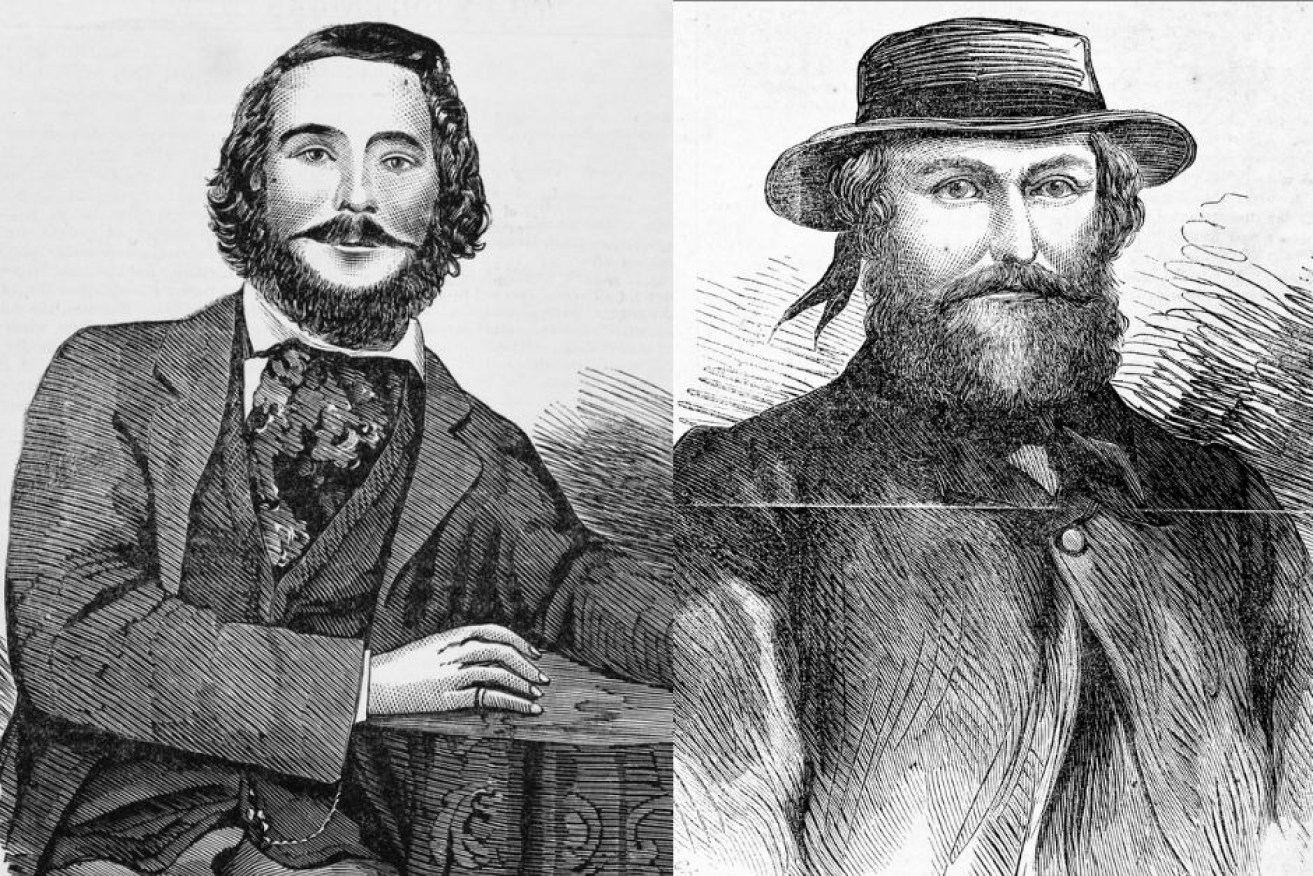
Frank Gardiner (left) and Ben Hall were part of the gang that pulled off the audacious heist. Photo: State Library Victoria
The plan for Australia’s largest gold robbery was hatched over a bottle of gin in the kitchen of a small house near Forbes in country New South Wales.
The eight bushrangers would hold up a gold escort transporting a consignment from Forbes to Orange, then on to Sydney.
As they plotted, they had no idea they’d soon make off with about 77 kilograms of gold and 10 bags of cash — a haul that would be worth about $10 million today.
It was 1862. Forbes was the main town servicing the goldfields in the central west of New South Wales, then a British colony.
Frank Gardiner, the gang’s leader, was the brains behind the heist.
Every Sunday, he’d watch from his butcher shop as boxes of gold were put into a wagon destined for Sydney.
His shop was mostly a front for his cattle-stealing business, and it wasn’t hard for Gardiner to find recruits for the audacious plan.
“He was living under an alias, but pretty much all the people in the area knew who he was and knew he was the infamous bushranger,” says author and journalist James Phelps, who researched the robbery for his new book Australian Heist.
“[Gardiner] had some younger guys who really looked up to him and wanted to get involved, and a few of them had done little jobs with him here and there.”
‘Easy pickings’

A relic from the 1862 robbery. Photo: Orange Regional Museum
Among the gang was Ben Hall, who would go on to become one of Australia’s most infamous bushrangers.
The sister of Hall’s wife was having an affair with Gardiner, so the men got to know each other.
“Gardiner saw a lot of talent in Ben. He saw what we all came to see later, and he recruited him. Ben went and recruited others,” Phelps says.
The bandits mapped out the gold routes and places they could execute the robbery.
The wagon was protected by just four officers with guns, Phelps says, and there were no forward or rear flanks.
“So, pretty easy pickings when you’ve got 400-kilometres-odd to go in the bush and the Blue Mountains to get to Sydney,” he says.
The gang would carry out the robbery days after meeting in the kitchen in a gully known as Eugowra Rocks.
Officer shot in testicles
The plan was simple.
Half the gang would hide behind a boulder, about the size of a hut, the others in a nearby creek bed.

The site of the robbery near Eugowra in central west New South Wales. Photo: Orange Regional Museum
They would ambush the passing wagon and execute the heist without harming the victims.
The bushrangers expected the officers to surrender the gold after they sprang from their hideouts and yelled “Bail up”.
But they had misjudged the officers’ reaction.
“There were 77 kilos of gold on board, so they weren’t going to give it up without a fight,” Phelps says.
“They’d lose their job. They’d be disgraced. They’d be called cowards.”
The men fired on the gang, sparking “an incredible shootout”, Phelps says.
“We had a trap [officer] shot in the testicles, believe it or not, which is quite horrific.”
But the officers, heavily outnumbered, were eventually overpowered.
“A couple did the bolt. Two others were wounded, left there on the ground,” Phelps says.
“So the bushrangers closed in. They tied them up [and] basically said ‘Wait here until you’re saved. Don’t chase us’.”
‘The most wanted men in the British Empire’
When the gang reached the lockbox, they were shocked by what they found.
“They opened that lockbox [and] there it was, 77 kilos of gold,” Phelps says.
“They were expecting maybe 10 kilograms.
“It was a staggering amount. It was in nuggets. It was in shavings.”

A plaque erected at the site of the gold robbery near Eugowra. Photo: Orange Regional Museum
The gang also scored 10 bags of cash.
The bushrangers knew their lives would never be the same again, Phelps says.
Not only had they stolen millions, they had shot two officers.
“So, they suddenly know that they are going to become not just the most wanted men in New South Wales, [but] the most wanted men in the British Empire,” Phelps says.
Can’t run forever
As news of the gang’s exploit spread, the bushrangers found an unlikely ally in the press and the people.
“They were romanticised. The press was on their side,” Phelps says.
“The newspapers were very popular at that time and they didn’t do the establishment many favours and they painted these guys like heroes.”
But justice eventually caught up with most of the bandits, in one way or another.
Four of the men were brought to Sydney to face trial. One was hanged.
Gardiner escaped to a quiet life in Queensland, but was later charged and jailed for other offences.
He was released years later on the condition he be exiled. He moved to the United States, where he lived with a wife and two sons.
Hall continued his villainy and grew in notoriety. But in 1865, his luck ran out, when he was shot dead by police.
A mystery endures
As for the gold, questions remain to this day.
Police recovered a small percentage of the gold, and Hall allegedly buried his share under a tree, Phelps says.
In his research, the author stumbled upon newspaper clippings and first-hand accounts of Americans who came to Australia about 20 years later with a map looking for uranium.
“They allegedly dug up some gold and took it back to the States,” Phelps says.
“The story has it that they were Frank Gardiner’s nephews or children.”
The fate of the bushrangers
- Frank Gardiner went to jail before being exiled to America
- Ben Hall continued a life of crime until 1865 when he was shot dead by police
- Alexander Fordyce was tried twice and served 10 years in jail
- John Bow was tried twice and served 10 years
- Henry Mann was hanged
- John Gilbert continued a life of crime but was shot in 1865
- John O’Meally was shot dead in November 1862
- Dan Charters informed on the rest of the gang and was pardoned
- John McQuire was not at the robbery but was jailed as an accomplice
Source: Central NSW Museums
